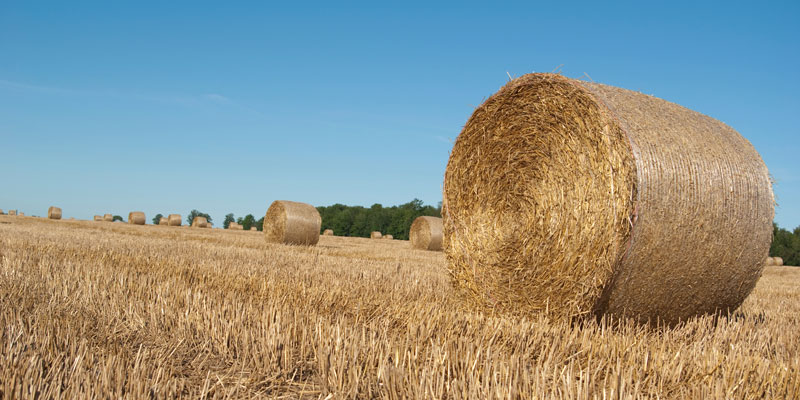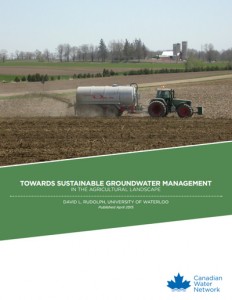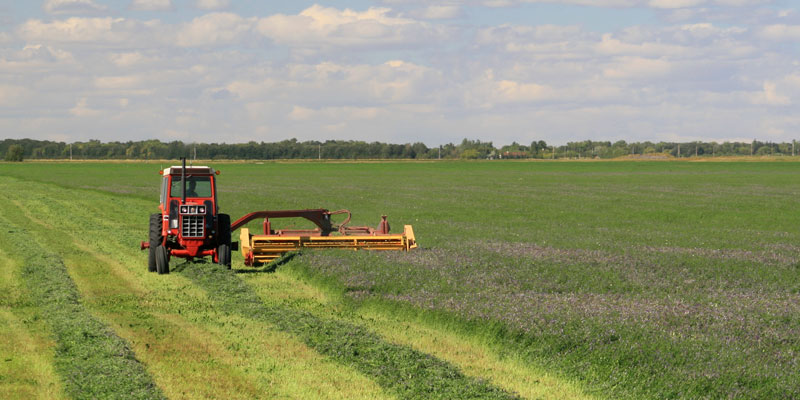Towards economic and environmental sustainability in agriculture through the implementation of combined beneficial management practices and remedial approaches designed to minimize impacts to water quality
Principal Investigator - David Rudolph, Professor, University of Waterloo, 2008 - 2012

Challenge
Groundwater quality degradation resulting from agricultural land‐use has evolved from a topic of concern to a major regulatory issue worldwide. Focus has been placed on excess nutrients and microbial contaminants from regional land application of commercial fertilizer and manure. Legislation to enhance both economic and environmental sustainability of agricultural practices is being considered, yet there is little critical science-based support for developing policy tools. Beneficial Management Practices (BMPs) intended to minimize impacts on groundwater quality are being proposed and implemented with little understanding of performance expectations. Development of an integrated approach that combines science‐based information, economic considerations and social implications will improve our understanding and support development of realistic legislation.
This project, led by Dr. David Rudolph, provides information on the performance and socio-economic implications of BMPs. It also developed strategies to remediate impacts from regional-scale application of nutrients on land, with an emphasis on the magnitude and timing of potential reductions in impacts to groundwater quality.
Project
This project assessed the performance and economic implications of beneficial management practices (BMPs) designed to minimize groundwater quality impacts from agricultural nutrient management. This involved the development of novel field monitoring strategies, predictive modeling techniques, and economic evaluation methods.
The effectiveness of targeted remediation strategies in the field was evaluated. This was done to determine which strategies provided the greatest reduction in impacts on regional groundwater quality from agriculturally sourced nutrients and pathogens. Field sites were established at locations across Canada in collaboration with private and public stakeholders.
The team found that improvements in subsurface water quality and reduced risks to drinking water wells can result in areas where nutrient loadings are reduced through BMP implementation. However, improvements in regional groundwater quality may take years to be fully realized. Remedial strategies that enhance denitrification in tile drainage and in situ near municipal wells were effective at rapidly reducing groundwater nitrate concentrations. BMP performance also depends on local geologic and hydrologic conditions, and extreme hydrologic events can result in rapid infiltration and a major threat to groundwater from microbial contaminants.
The costs of making these changes in agricultural practices at farms and the social issues of convincing farmers to adopt the practices were also examined. Economic scenario analysis was used to prioritize alternative models of BMP implementation to improve uptake and inform guidelines. The utility of various modeling tools used to predict the magnitude and temporal nature of implemented BMP were investigated through integration with field data sets derived throughout the course of this project.
Outputs
- Results from the research activities in Southern Ontario have been showcased on two occasions within the trade magazine, Pigs, Pork and Progress. The emphasis has been on the positive performance of nutrient management BMPs and on the risk associated with tile drains in agricultural settings.
- A report was specifically targeted to project end users (OMAFRA) on assessing 3 different pedo-transfer functions for estimating soil hydraulic properties. This information can be used to determine soil hydraulic properties for modeling soil water budgets and contaminant transport under current and alternative agricultural management practices.
- Researchers have participated in several workshops to exchange and discuss impacts of nutrient management in the raspberry growing regions of British Columbia.
- Researchers have developed numerical models for regional water and nutrient balance studies.
- Development of novel field monitoring strategies, predictive modeling techniques, and economic evaluation methods.
Outcomes
- The results of this work have been used by a number of government agencies.
- Findings from the regional monitoring of microbial species have led the Ontario Ministry of the Environment to adopt the influence of extreme hydrologic events as part of their Tier 3 Source Water Protection strategy
- Field observations on the role of extreme hydrologic events in groundwater vulnerability have been used by the Ontario Ministry of the Environment’s reassessment of the GUDI (Ground water under the direct influence of surface water) designation for drinking water wells.
- Best Management Practices (BMPs) adopted at one field site are being considered for wider application by the Ontario Ministries of Agriculture and Environment.
- The work on functionality and cost effectiveness of combined agricultural BMPs and remedial measures is also expected to influence future nutrient management legislation designed to minimize risk to water quality from agricultural land use across a number of jurisdictions.
- Several team members have been engaged on a panel with the Council of Canadian Academies to review the sustainability of water in agriculture.
- At the encouragement of government partners, results from the BC raspberry growers’ forum were reported directly to an inter-ministerial committee of the BC government addressing agricultural and environmental issues.





